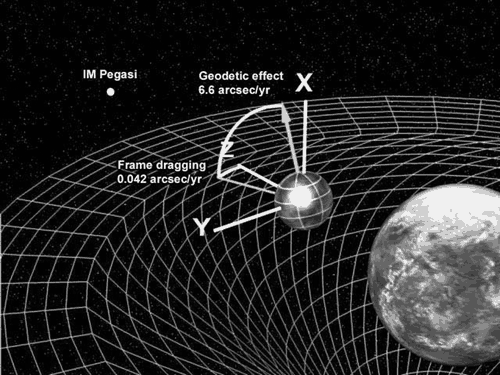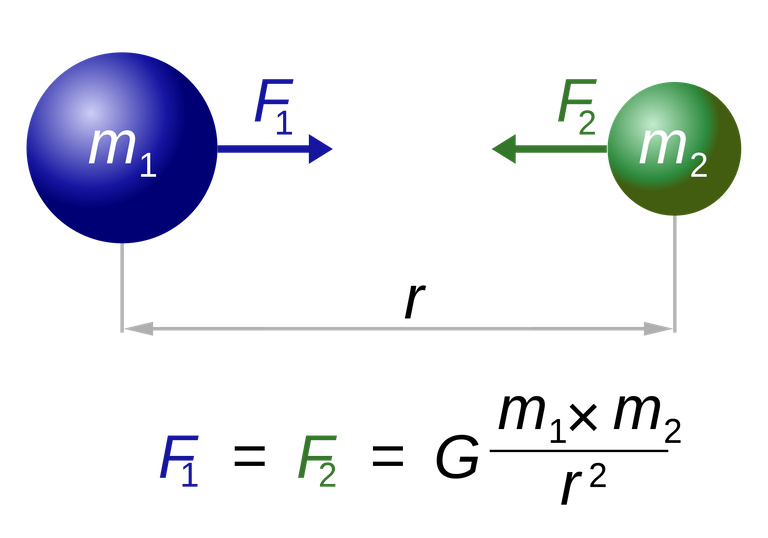Up until now you have learned about forces that directly interact with something. Now get ready for action at a distance

(source)
Action at a distance is a field force
Today you will learn two main field forces. Gravity and electromagnetism. They are both field forces. Field forces affect all objects within the field and not just one. This means everything in the observable universe interacts with everything else, at the speed of light.
All matter is affected by gravity
Gravity warps space-time and thus nothing is free from it. Light has no mass and it's path is not changed the space of the path does. This will be about the attraction between two objects. All massive objects attract each other.
Gravity is one of the four fundamental forces of nature. It warps space is the best explanation for what we have, we know little to nothing more. We are unable to even combine it with the other forces on a quantum scale.
How to determine gravity
Gravity is determined by a few simple principles. It decreases by the square of the distance for example if an object is twice as far away, the gravity is one forth, if an object is 3 times farther away the gravity is one ninth.
The amount of force is the masses of the two objects multiplied. An object with almost no mass with be attracted to the earth at the same speed relative to its mass, however, the earth will be attracted up to it at a different speed depending on its mass. Since the Earth is so massive it doesn't move that much. We can't actually measure the movement for small objects so that's why we say everything falls at the same speed.
Since the universe does not conform to our units we must multiply this by a constant. This is called the gravitational constant and is 6.67408 × 10^-11. This means that a large amount of mass is needed to have any measurable affect.

(source)
This equation can be used to find the gravitational force between any two massive objects. The distance between the objects is usually considered to be the distance between the centers of the objects. The objects center is where on average the object is. The lesser gravity on one side and the higher gravity on the side closer to you cancel out.
Let's try out this equation now.
Imagine two objects that are both 1,000,000 kilograms at one kilometer apart.
(1,000,000 * 1,000,000 * 6.67408 × 10^-11) / (1000^2)
That is 6.6 * 10^-5 or 0.000066 Newtons of force.
Or an acceleration of 6.6 *10 ^-11 m/s^2.
However it speeds up as they get closer.
This requires calculus and is beyond the scope of this "basic physics" course.
This shows that basically gravity is weak af and should hit up the gym
Electromagnetism
Electromagnetism has one major difference from gravity. It has an opposite charge. Things can both attract and repel each other. We usually only see the charges of electrons and protons, which are equal and opposite.
The equation is simply the same but with a different constant, and is multiplied by negative one. This is because when the forces are the same, they repel. Which we think of as negative force, it is completely arbitrary.
The constant is 8.99 * 10 ^ 9. This one is quite a bit bigger. Turns out electromagnetic force has a really strong hold but is mostly canceled out at an atomic level. The mass is not factored into the force but has an effect on acceleration.
Gravity (as far as we know) does not have an effect on the quantum world, while electromagnetism does. It is what binds electrons to atoms. Although atoms can have more electrons than protons which should repulse them.... Sadly quantum mechanics is a little more complicated than classical physics.
( source)
Let's look at a quick example.
Two magnets that are both positive with 2 Columbus of charge are held 3 meters apart from each other. If they each have a mass of one hundred kilograms how much acceleration do they have?
(c = charge)
(C1 * C2 * constant) / distance^2 = force
(2 * 2 * 8.99 * 10 ^9) / 9 = force
This is about 4 *10 ^9 newtons.
4 * 10 ^9 /100 = 4 *10 ^7
4 *10^7 m/s^2
This is some major acceleration.
This is why magnets can be really hard to separate once they get stuck together.
Lets look at the same magnets 1000 times farther away in space.
The distance would then be 3000 meters or just 3 kilometers.
(2 * 2 * 8.99 *10^9) / 300^2 = force
force = 4000 N
the acceleration would then be by 40 m/s^2. This is an extremely small amount compared with before. These magnets are extremely powerful.
Because a coulomb is 6.2 * 10^18 electrons.
There are 6 * 10 ^28 protons in 100 kilograms (if only made out of protons)
This would mean that this is really ionized and stronger than any industrial magnet we have today.
This is only a basic understanding of them and how to compute them. This is only a basic understanding.
I will post more advanced versions of each of these topics at one point.
If anybody has any suggestions on new posts I would love to hear them.

Are you familiar with some of the more complex parts of the physics of gravity like special/general relativity?
The ideas but not the equations lol